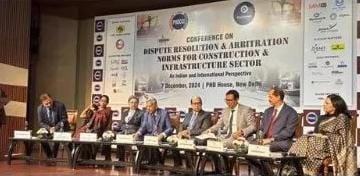“India Has the Potential to Develop a System of Self-Executing Contracts, Minimizing the Need for Adjudication,” Says AGI Venkataramani at PHDCCI & ProUltimus Conference on Dispute Resolution and Arbitration Norms for the Construction and Infrastructure Sectors”

On December 7th, 2024, PHD Chamber of Commerce and Industry (PHDCCI), in association with ProUltimus Consulting, hosted a conference on “Dispute Resolution & Arbitration Norms for the Construction and Infrastructure Sectors” at the PHDCCI Auditorium in New Delhi. During the event, AGI Venkataramani highlighted India’s potential in creating a system of self-executing contracts, which could significantly reduce the need for judicial intervention.
India’s Legal Landscape in Construction & Infrastructure Dispute Resolution: Insights from PHDCCI & ProUltimus Consulting Conference
On December 7, 2024, the PHD Chamber of Commerce and Industry (PHDCCI), in collaboration with ProUltimus Consulting Pvt. Ltd., hosted a high-impact conference on ‘Dispute Resolution & Arbitration Norms for the Construction & Infrastructure Sector’ at the PHDCCI Auditorium in New Delhi. This event brought together legal experts, industry leaders, and stakeholders to explore the evolving challenges in dispute resolution and arbitration within India’s construction and infrastructure sectors.
ProUltimus Consulting Pvt Ltd leading management consulting firm in India specializing in Claim Management and Arbitration for the Engineering and Construction industry, co-organized the conference. and Mr.Adarsh Kumar ,Partner in ProUltimus Consulting Pvt Ltd emphasized that his company organised Event with PHDCCI for serving this as a pivotal platform for discussing innovative solutions to the complex legal issues emerging from large-scale infrastructure projects and the regulatory complexities inherent in the construction sector.
One of the key highlights of the event was the emphasis on the growing importance of Alternative Dispute Resolution (ADR) mechanisms, particularly arbitration, in resolving construction disputes. Given the sector’s susceptibility to delays, cost escalations, and contract misinterpretations, the need for effective and efficient ADR strategies has become more critical than ever. The conference stressed the importance of standardizing arbitration norms to foster transparency and promote cooperation among all parties involved in construction projects.
Dr. Jatinder Singh, Deputy Secretary General of PHDCCI, delivered the opening remarks, noting the rapid pace of economic development in India. He emphasized the need for domain experts to stay ahead of the curve and address disputes proactively. This collaborative effort between PHDCCI and ProUltimus, he stated, aimed at shaping the future framework for the Indian economy, particularly within the construction and infrastructure sectors.
Ms. Charanya Lakshmikumaran, Chair of the Law & Justice Committee at PHDCCI, reflected on India’s significant growth in global infrastructure and supply chains, stressing the need to introspect on how arbitration can become a robust alternative dispute resolution tool.
In his keynote address, Mr. Anand Kumar Singh, Director (Projects) at Ircon International Ltd., underscored the importance of clear contract terms and early intervention to prevent disputes from escalating. He highlighted the successful resolution of disputes worth ₹1.2 lakh crore through a structured matrix approach, showcasing the power of preemptive measures in dispute resolution.
Justice A.K. Sikri, former judge of the Supreme Court of India, was the Guest of Honour. He addressed the critical issues surrounding construction disputes in India, particularly delays, cost escalations, and contractual obligations. He emphasized the need for speedier dispute resolution, especially in public-private partnership (PPP) projects, and advocated for the MED-ARB (Mediation-Arbitration) approach, which has proven successful internationally.
Justice (Retd.) Jayant Nath furthered the discussion, reflecting on his own experience transitioning from a Civil Court Judge to an arbitrator. He acknowledged the necessity of arbitration in construction disputes, particularly given the technical complexity of these cases. He also highlighted the benefits of arbitration, such as confidentiality and expedited timelines, which make it a preferred mechanism for resolving disputes in large-scale infrastructure projects.
The event also featured an insightful address by R. Venkataramani, Attorney General for India, who discussed the evolution of arbitration law in India and the impact of legislative changes such as the RERA Act and consumer protection laws. He proposed the idea of an amalgamated legal system that combines arbitration, mediation, and other legal frameworks for more efficient dispute resolution.
R. Venkataramani concluded by emphasizing India’s capability to create a self-executing, self-working contract system that could minimize the need for adjudication and disputes altogether. This forward-thinking vision, he argued, positions India as a leader in global legal innovation.
The conference culminated in calls for action to create more dynamic and flexible legal systems that adapt to the complexities of modern construction and infrastructure projects. By fostering collaboration between legal, business, and government entities, the event set the stage for developing a comprehensive, efficient, and adaptable dispute resolution system for the future.
